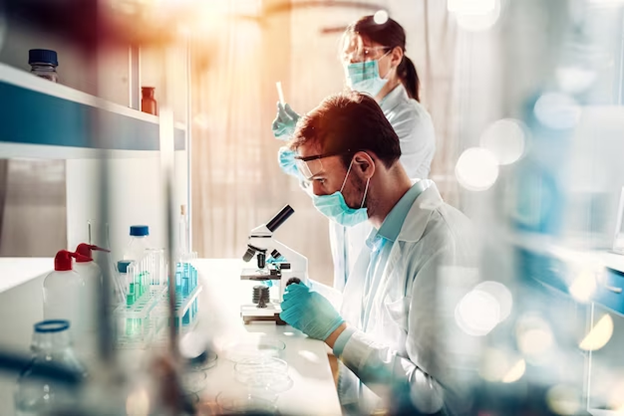Medical Laboratory Technician
The primary role of a laboratory technician is to assist industry scientists in their research and testing. This can involve a number of different tasks. Our graduates work in a laboratory performing analytical or experimental procedures, maintaining laboratory equipment.
Technicians collect blood, classify it by type, and prepare blood and its components for transfusions. In addition he or she prepares specimens and analyzes the chemical and hormonal contents of body fluids. The program teaches you how to prepare and examine slides of body cells under a microscope.
The program may vary in duration and content based on state regulations and specific program offerings. Graduates of this program will be prepared for careers as licensed medical laboratory technicians, working in hospitals, clinics, research laboratories, and more.

Diploma in Medical Laboratory Technician Program
Duration: Typically, 2 years (varies by program).
Trimester 1: Introduction to Medical Laboratory Science
- MEDL 100: Introduction to Medical Laboratory Science
- Overview of the medical laboratory technician profession
- Role in patient care and healthcare
- Ethical considerations in the laboratory
- APHY 100: Anatomy and Physiology
- Study of human anatomy and physiological systems
- Relationship to laboratory testing
- Common diseases and disorders
- MEDTEC 100: Medical Terminology
- Vocabulary and terminology used in healthcare
- Interpretation of medical records and reports
- Communication with healthcare professionals
- PSC 100: Phlebotomy and Specimen Collection
- Blood collection techniques
- Specimen handling and transport
- Infection control and safety procedures
Trimester 2: Clinical Chemistry and Hematology
- CLICHE 100: Clinical Chemistry
- Introduction to clinical chemistry tests
- Blood glucose, liver function, and renal function tests
- Laboratory instrumentation and quality control
- HEM 100: Hematology
- Study of blood components and their functions
- Complete blood count (CBC) analysis
- Blood disorders and morphology
- PCLAB 100: Pre-Clinical Laboratory Practice
- Pre-clinical training in the laboratory
- Instrumentation and analyzer use
- Safety protocols and quality assurance
- IMSE 100: Immunology and Serology
- Introduction to immunology and serological testing
- Antibody-antigen reactions
- Blood typing and cross-matching
Trimester 3: `
- CLIMI 100: Clinical Microbiology
- Identification of microorganisms (bacteria, fungi, viruses)
- Culture and sensitivity testing
- Urinalysis and body fluid analysis
- CLM 100: Clinical Laboratory Management
- Laboratory operations and management
- Quality assurance and compliance with regulations
- Inventory control and record-keeping
- CLLAB 100: Clinical Laboratory Practice
- Hands-on clinical practice in a healthcare setting
- Sample analysis, testing, and reporting
- Working with a team of healthcare professionals
Trimester 4: Clinical Specializations and Licensure Preparation
- CLIM 100: Clinical Immunohematology
- Blood bank operations and testing
- Compatibility testing and transfusion medicine
- Donor recruitment and management
- CLMV 100: Clinical Microbiology and Virology
- Advanced microbiological techniques
- Identification of emerging pathogens
- Infection control and prevention
- LICP 100: Licensure Preparation
- Review and preparation for medical laboratory technician licensure exams
- Mock exams and test-taking strategies
- State-specific requirements and regulations
- CLIASL 100: Final Clinical Assessments and Licensure
- Successful completion of required clinical hours.
- Successful performance in licensure exams
Graduation and award of the Diploma in Medical Laboratory Technician
Students have to contact the school administration if they want to take extra credits or transfer credits to pursue the Diploma Certificate or Associate of Applied Science (A.A.S.) Degree in their field of interest. Students will select required number courses in each of the areas listed to meet general education requirements graduation for the A.A.S. Some of these courses can be transferred directly from and to the university system and may be substituted for recommended courses on the outline. Students should speak with an advisor before doing so these selective courses are required for all students.
- Selected Communication Course (Choose two for Diploma or three for the Associate)
ENGL 100: Fundamentals of Speech
CPL 100: Career Planning
CPL 101: Communications and Career Strategies
ENGL 101: Composition
ENGL 102: composition
- Selected Mathematics Course (Choose two for Diploma or three for the Associate)
MATH 100:General Math
MATH 101:Intermediate Algebra
MATH 102:College Algebra
- Selected Social Science Course (Choose two for Diploma or four for the Associate)
ECON 105:Leadership
ECON 101:Principles of Microeconomics I
ECON 102:Principles of Macroeconomics II
SOC 101:Introduction to Sociology
PSYC 101: Introduction to Psychology
HIST 101: History
